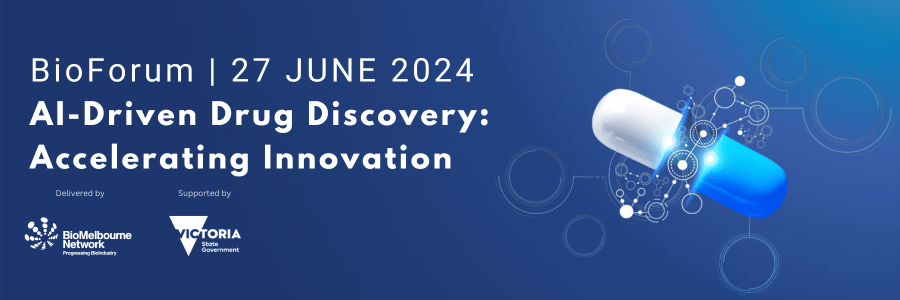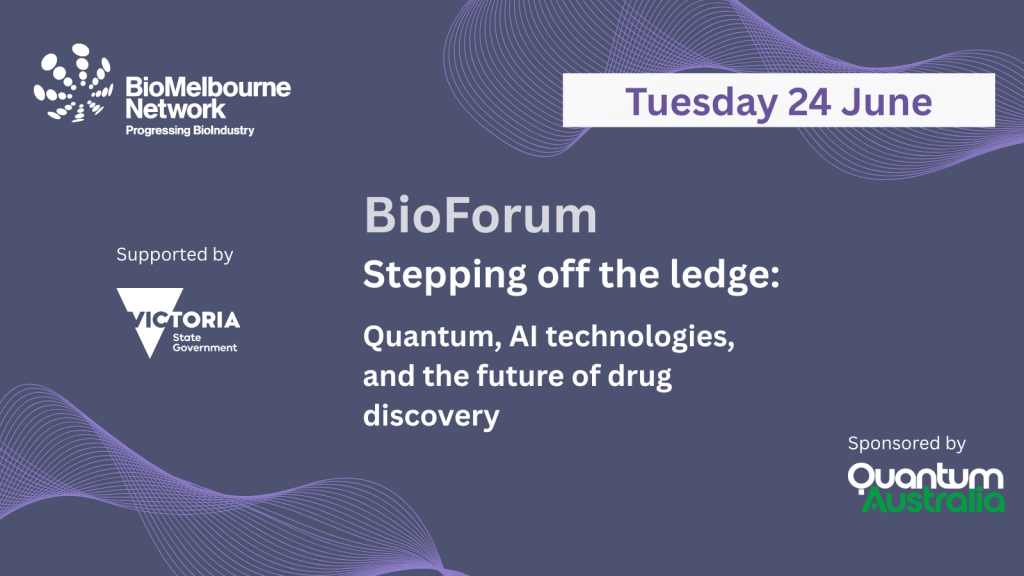
- This event has passed.
BioForum – AI-Driven Drug Discovery: Accelerating Innovation
June 27, 2024 @ 4:00 pm - 6:30 pm AEST
Event Navigation

Victoria’s strong drug discovery capabilities are driven by world-class research and development and formidable collaborations across the ecosystem. A significant portion of Australian clinical trials take place here. However, drug discovery is a long and expensive process – and not always successful in commercialising.
AI tools have the potential to increase efficiency at every step, from early-stage computer simulations to late-stage trial design, patient recruitment and data analysis.
This event will explore computational drug discovery, AI-assisted progression of pre-clinical candidates to clinical trials and the benefits and challenges of AI throughout the development pipeline. Discussions and presentations from sector leaders will examine how AI can transform drug discovery by improving efficiency, reducing costs and accelerating development timelines.
Be informed about:
- AI in drug discovery – The what and why
- Opportunities – Applications, global competitiveness and job creation
- Challenges and solutions – AI limitations and reliability
- Support – Partnerships, resources and regulation
- The future – Emerging trends and more.
Who should attend:
- Biotech and pharmaceutical executives focused on innovation and development.
- Scientists and clinicians engaging in research, disease modelling, drug discovery, preclinical and clinical trials
- Professionals seeking to improve knowledge and foster connections.
Event details:
Date: Thursday 27 June 2024
Time (AEST):
3:45 pm: Guest arrival and registration
4:00 pm – 5:30 pm: Presentations and Q&A
5:30 pm – 6:30 pm: Networking
Format: Hybrid – In person and live-streamed
Venue: Science Gallery Melbourne Theatre, 114 Grattan St, Carlton VIC 3053
Speakers:
Dr Herbert Treutlein, Co-Founder and Director, Sanoosa
Dr Jessica Holien, Senior Vice-Chancellor’s Research Fellow, RMIT University
Dr Lukasz Kowalczyk, Senior Scientist, Protein Production, AdAlta
Dr Lauren May, Group Leader, Monash Institute of Pharmaceutical Sciences
Facilitator: Dr Ken Seidenman, Senior Associate, FB Rice
BioMelbourne Network host: Dr Tim Oldham, Director, BioMelbourne Network
Registration:
In-person: Members $85; Non Members $175
Online: Members $25; Non Members $45
This BioForum is sponsored by the State Government of Victoria.

Cancellation Policy
In-person registration:
Full refund given up to 7 days prior to the event
No refunds within 7 days of the event
Online registration:
Full refund given up to 3 days prior to the event
No refunds within 3 days of the event
Dr Ken Seidenman, Senior Associate, Patent Attorney (Biotechnology), FB Rice - FACILITATOR
Ken will leverage his background to delve into intellectual property considerations within the growing integration of AI and biotech. He will offer insights to help innovators and collaborators navigate the evolving AI-biotech landscape with clarity and pragmatic strategies. Ken has played a significant role in pursuing patent protection of several prominent biotechnology and therapeutic developments including human induced pluripotent stem cells, CRISPR gene editing, and the blood cancer blockbuster drug, Imbruvica (Ibrutinib).
With a practical approach, Ken guides biotechnology patent portfolios from inception to expansion, supporting clients in drafting, prosecuting patents, and devising strategies for commercial success.
Ken’s thought leadership extends beyond his IP practice. He recently published an article on the potential impact of AI on the enablement of biopharmaceuticals, particularly antibodies, and actively contributed to industry discussions around what AI and machine learning mean for our innovators’ intellectual property. His multifaceted involvement underscores his commitment to guiding innovators through the intersections of biotechnology, AI and intellectual property.
Dr Herbert Treutlein, Co-Founder and Director, Sanoosa
Herbert received his PhD in Physics from the Technische Universität München in Germany, working on electron transfer in the photosynthetic reaction centre. He later worked at the Department of Molecular Biophysics and Biochemistry at Yale University, before moving to Melbourne to start the Molecular Modelling Group at the Ludwig Institute for Cancer Research in Parkville, focussing on modelling cytokine and cytokine receptor complex structures. He later led the computational team at Cytopia where the JAK2 small molecule inhibitor, momelotinib was developed, which is now sold under the brand name Ojjaara by GSK, and JAK3 inhibitors that were licensed to Novartis.
More recently using methods developed in start-up companies co-founded by Herbert, small molecule inhibitors for tropomyosin polymerisation, PCSK9-LDL receptor interactions and other difficult-to-drug targets have been developed. He also created a proprietary drug discovery system at Sanoosa to identify small molecules and scaffolds that inhibit cellular signalling for their projects and commercial partners.
Herbert has published 65 scientific papers on his research in academia and industry in international peer-reviewed journals, including 6 patents.
Dr Jessica Holien, Senior Vice-Chancellor’s Research Fellow, RMIT University
Jessica’s research career to date bridges the chemistry-biology divide, incorporating medicinal chemistry, biology and computational modelling. After her PhD in Medicinal Chemistry, Jessica has used her computational modelling skills to design molecules which were licensed to Amplia Therapeutics and entered clinical trials in 2020 (Cancer Therapeutics CRC, FAK inhibitors). Her postdoctoral positions, predominately at St Vincent’s Institute of Medical Research, gave Jessica practical commercial experience in drug discovery, working with biotech (Biota), and large pharma (Servier). In 2020, she joined RMIT University under the Vice-Chancellor’s Fellowship Scheme.
Jessica continues to have strong industry links, providing computational modelling support to biotechnology companies, including Pathios Therapeutics, VAST and MycRx. Academically, her lab uses cutting-edge, machine learning methods to enrich traditional bioinformatic analysis and improve high-throughput chemistry screens, leading to faster small molecule chemical hit identification. Jessica is interested in understanding the mechanisms behind protein-protein interactions and developing tools to design small molecule inhibitors to modulate them.
Dr Lukasz Kowalczyk, Senior Scientist, Protein Production, AdAlta
Prior to AdAlta, Lukasz worked on structure and function of membrane transporters, ion channels and GPCRs at IRB Barcelona, WEHI and Monash Institute of Pharmaceutical Sciences. In 2015, he moved to Australia’s national science agency, CSIRO, where he supported industry partners to deliver and commercialise research projects and ideas. Lukasz was involved in various projects ranging from antibody engineering and protein therapeutics to vaccine development. He was also part of the team that produced the first University of Queensland - CEPI COVID-19 vaccine candidate, which reached Phase 1 clinical trials.
At AdAlta, Lukasz leads the Research Excellence program, with a strong focus on innovation and process improvement. AI has become an integral part of this program and one of the main goals of Research Excellence is to leverage AI tools and methods to enhance the efficiency and quality of AdAlta’s drug discovery and development.
Dr Lauren May, Group Leader, Monash Institute of Pharmaceutical Sciences
She uses her molecular pharmacology expertise to apply new and innovative GPCR drug discovery approaches for the development of safe and effective therapeutics. Lauren employs a multidisciplinary approach to achieve these research goals, including artificial intelligence, computational biology, molecular and analytical pharmacology methods alongside ex vivo and in vivo models.
Lauren received a 2018 Heart Foundation Paul Korner Innovation Award for the most innovative Future Leader Fellowship. She is committed to improving health outcomes as coordinator of the MIPS Cardiovascular and Metabolic Health Program, advisory member for the Australian Cardiovascular Alliance Drug Discovery Flagship, Chair of the MIPS Climate Health Focus Group and Faculty Representative for the Monash University Impact 2030 ‘Climate Change’ initiative.
Lauren has secured significant funding from the Heart Foundation, ARC, NHMRC and MRFF. Lauren has 69 publications, including 46 original research articles (e.g. Nature (x2), Cell, Nature Communications, Proceedings of the National Academy of Sciences USA) and 20 invited reviews (e.g. Nature Chemical Biology and Annual Review of Pharmacology and Toxicology). Her work is also cited in the latest edition of the textbook, “Rang & Dale’s Pharmacology.”
Lauren is an advocate for diversity in science, co-founder and past chair of Her Research Matters (2021 Monash University Vice-Chancellor’s Award for Excellence in Diversity and Inclusion) and a member of the 2019 International Women’s Forum Emerging Leaders Cohort.




